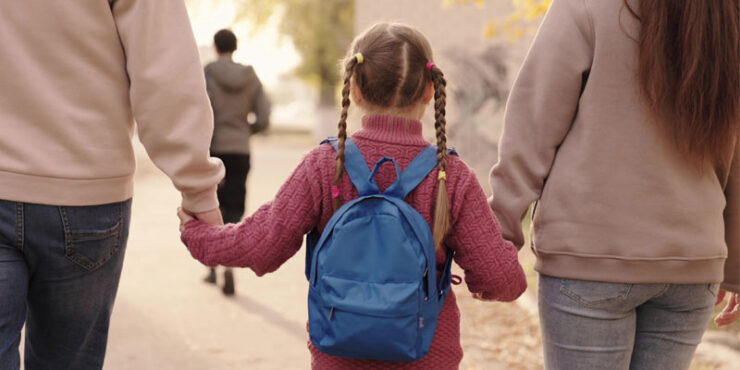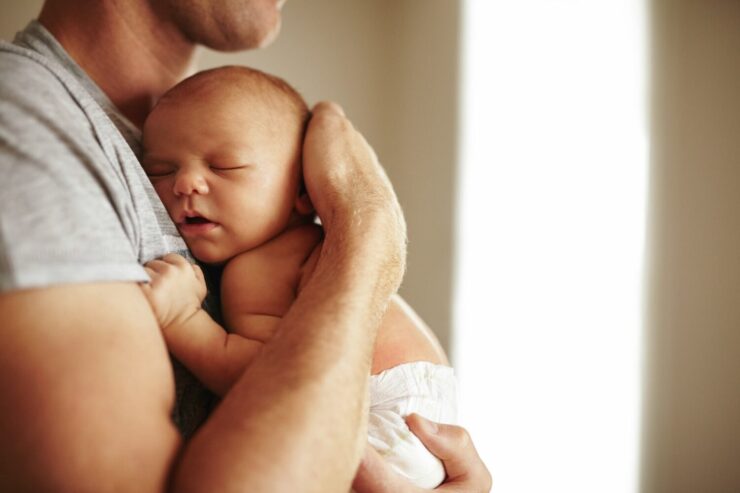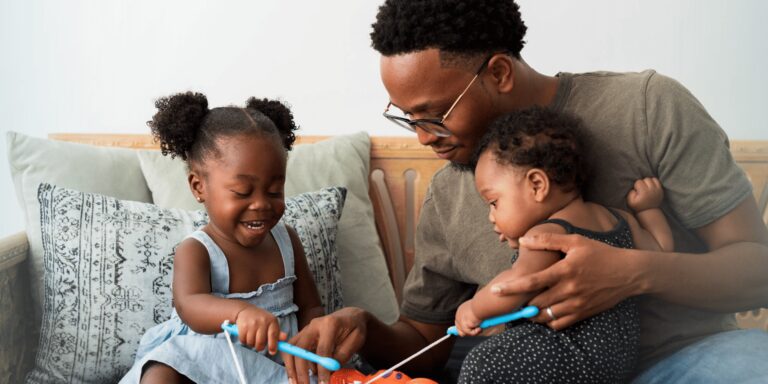In the parenting world, there’s still a traditional stereotype when it comes to how dads are seen: he’s usually the bumbling parent who’s clueless when it comes to changing diapers, feeding babies, or any other day-to-day caregiving task.
This stereotype not only undermines the capabilities of modern-day fathers but also perpetuates outdated notions of gender roles within the family dynamic.
While it’s true that societal expectations are evolving, there’s still much work to be done in recognizing the importance of fathers who want to be equal parents. These dads don’t want applause for changing a diaper; they want acknowledgment as equal partners in the parenting journey. So how do we get there?
Recognising Where Modern-Day Parenthood Is Today

Gone are the days when parenting was solely relegated to the role of mothers only. Modern fathers are actively involved in their children’s lives, from the moment they’re born.
Yet, despite this shift, there remains a lingering societal expectation for mothers to shoulder the majority of caregiving responsibilities, and where dads only come into focus when they are being wished happy birthday dad alone. This expectation not only marginalizes fathers but also undermines the potential benefits of shared parenting.
It’s time to debunk the myth that fathers are somehow incompetent or disinterested in caregiving tasks. Many dads today are not only willing but eager to be equal partners in raising their children. They are just as capable of changing diapers, preparing meals, and soothing crying babies as mothers are. However, what we need to move away from is the applause for performing these tasks but rather genuine acknowledgment as equal parents.
This is important because if we continually celebrate dads for everyday parenting tasks like changing diapers or performing other basic caregiving tasks, it reinforces the idea that such responsibilities are still inherently the mother’s role and responsibility. It suggests that when fathers step up to fulfil these duties, they are somehow going above and beyond their expected role. In reality, caregiving should be a shared responsibility between both parents, without the need for special recognition or praise.
The Benefits of Equal Parenting
Focusing solely on superficial acts like changing diapers overlooks the deeper significance of equal parenting. Shared parenting isn’t just about splitting household chores; it’s about fostering a strong bond between fathers and their children and promoting gender equality within the family unit. When fathers are actively involved in caregiving from the start, they contribute to their children’s emotional and cognitive development in meaningful ways.
Equal parenting also has numerous benefits for mothers. When fathers take on an equal share of caregiving responsibilities, mothers are afforded more time to pursue their own interests and careers. This not only promotes gender equality in the workplace but also strengthens the overall resilience of the family unit. Additionally, shared parenting can help alleviate the burden of parental burnout, allowing both parents to support each other in times of stress.
This point is particularly important at a time when modern-day ‘jobs’ are changing before our eyes. In fact economically, as childcare becomes the number 1 cost in most family lives, the ability to have a dual-income household is going to be more and more important.
Moving Toward Real Equality

It’s important to recognize that achieving equal parenthood requires systemic changes beyond individual attitudes. Workplace policies, societal norms, and cultural attitudes all play a role in shaping parental roles and responsibilities.
Employers need to offer parental leave policies that are inclusive of both mothers and fathers, allowing both parents to take time off to care for their newborns without fear of career repercussions. Similarly, societal attitudes towards fatherhood need to evolve to reflect the reality of modern parenting dynamics.
For new dads seeking to actively participate in early parenthood, finding the right gear is essential. Our guide on the best baby carrier for dads highlights options that combine comfort, functionality, and style, making it easier for fathers to share in all aspects of childcare and bonding from the start.
Furthermore, we must challenge traditional gender norms that dictate who should be responsible for what within the family. By encouraging boys to develop caregiving skills from a young age and promoting positive representations of fathers in the media, we can help break down barriers to equal parenting. It’s time to move beyond outdated stereotypes and embrace a more inclusive and vision of parenthood.
Here’s a three point action plan for enabling more change:
- Recognise that the system is broken: According to the World Economic Forum – there is a growing care crisis that is worth unto 6 Trillon to the US economy alone. That is an astronomical figure that shows just how much work is done by parents, and grandparents in raising children and others. But at a time where there are historic labor shortages, the economical growth is at a significant juncture now.
- Get dads to be more open: One of the biggest challenges we also need to address is that dads aren’t always the best at being open emotionally, and especially open at work about the changes they want to enable a far better work/life balance. We’ve slowly seen the emergence of dad groups and other work initiatives that give dads a true safe space to voice the changes they want. Unfortunately I still hear of far too many stories of dads who having tried to change something for the better at work, coming back from extended parental leave and being punished by being given the ‘grunt work’ or put in the ‘B-league.’ That needs to change, quickly.
- Getting partners to communicate: One of the areas we really need to change too is removing the gendered assumption that sits at the heart of modern partnerships. There are still too many mothers and fathers who assume what they’re role is in the partnership and don’t actively discuss what works best for them, as a whole family. Putting more energy into those conversations, and having them regularly (at least once a year) fosters a true partnership spirit that ultimately benefits the children too.

In conclusion, celebrating dads for changing diapers may seem like a harmless gesture, but it ultimately perpetuates outdated notions of gender roles and undermines the importance of equal parenting.
Dads don’t want applause for performing basic caregiving tasks; they want to be recognized as equal partners in raising their children. If we are to achieve true equal parenthood as a society, it requires a shift in societal attitudes, workplace policies, and cultural norms. It’s time to embrace a more inclusive and equitable vision of parenthood, where both mothers and fathers are valued as equal caregivers and nurturers.

